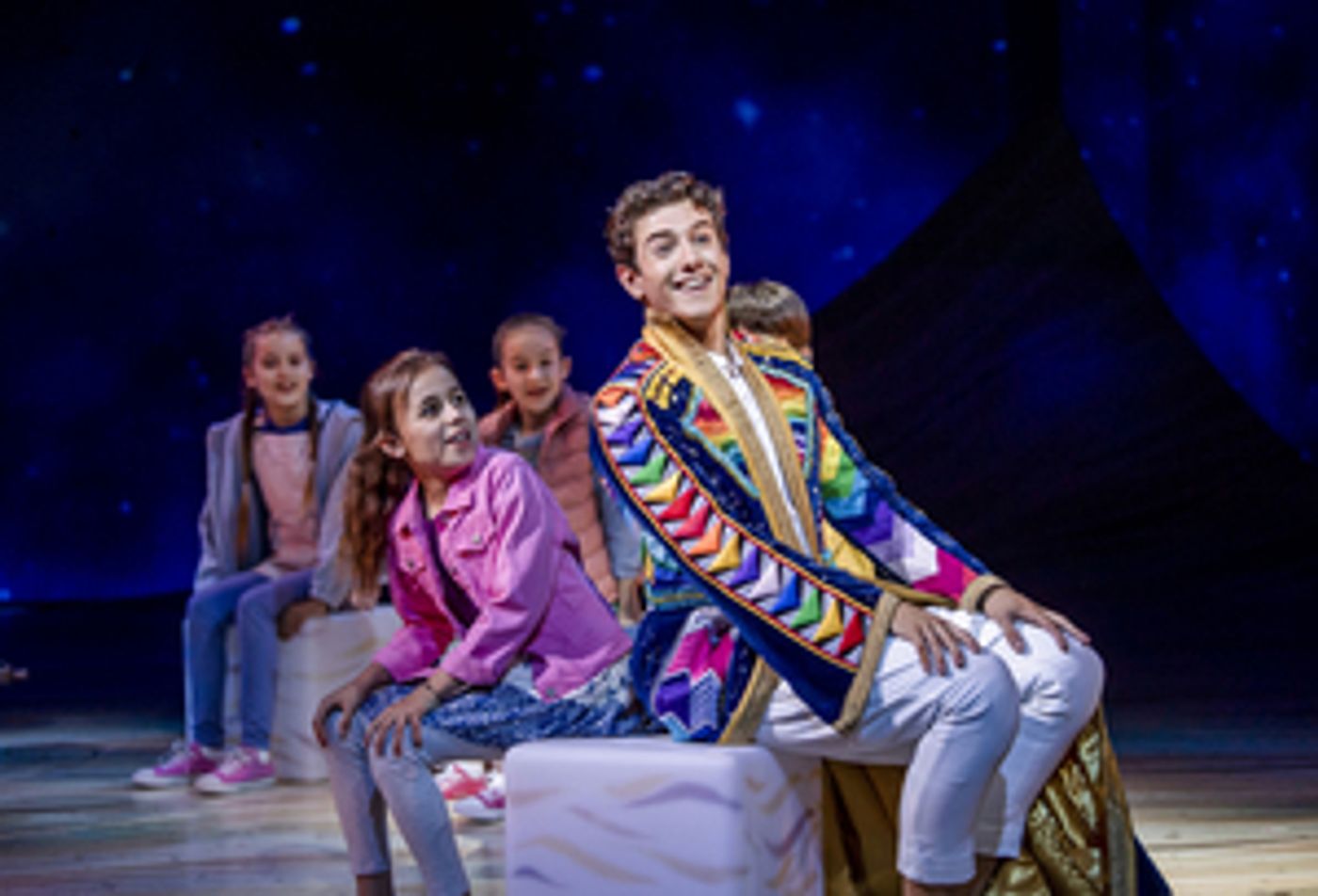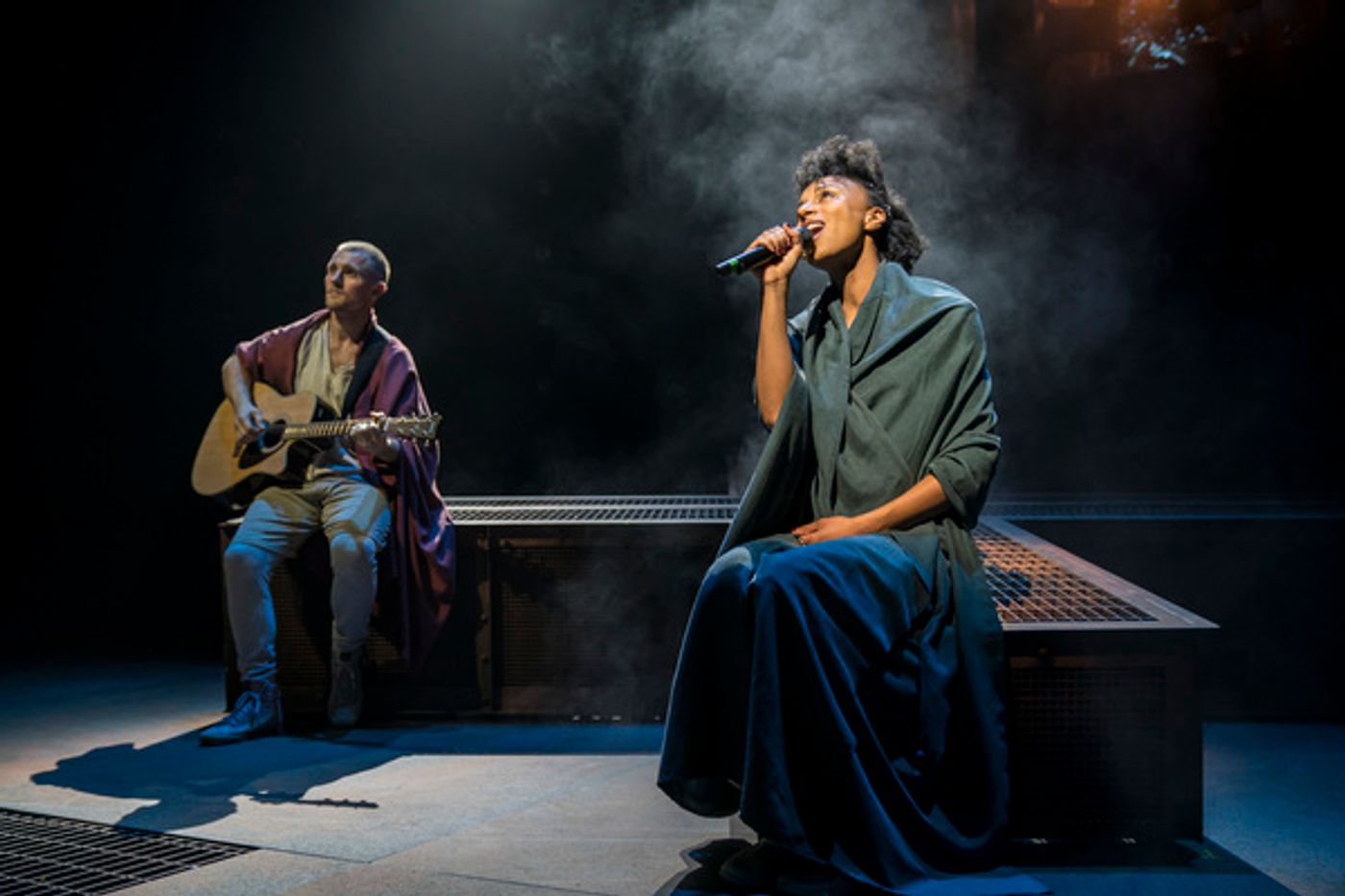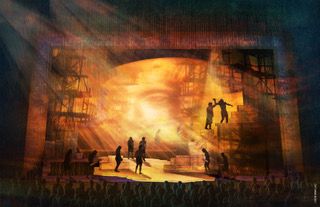Feature: The Renaissance of the Religious Musical

the Amazing Technicolor Dreamcoat
Why are religious musicals experiencing a comeback in the West End? BroadwayWorld spoke to London performers about stories of faith and how their personal outlook on life connects with the material.
In 2019, London audiences have so far had the chance to see a concert staging of Godspell and acclaimed revivals of Jesus Christ Superstar and Joseph and the Amazing Technicolor Dreamcoat - the latter of which has just announced a return to the London Palladium next summer.
Additionally, next year, the highly anticipated stage adaption of The Prince of Egypt will open at the Dominion Theatre. What do all these pieces of theatre have in common? Their source material can be found in the Bible.
This trend of religious musicals making a comeback struck me as unusual because, writing as a practising Christian, I assumed UK society as a whole wasn't as interested in these stories anymore - church attendance is continuing to drop, according to the latest census.
As you would expect, Bible literacy in the UK has also decreased as a result of fewer people in pews on Sundays. In the UK Bible Society's 2014 'Pass It On' survey, they reported that more than half of the children they surveyed had never engaged with the story of Joseph and his dreams of wheat or Moses parting the Red Sea with his staff.
If people are becoming less familiar with these stories, why are producers still choosing to stage them? I suppose they are relatively more familiar tales rather than taking a risk on a brand-new story. This is consistent with the increasing number of stage adaptions of existing franchises that we've seen of late and The Prince of Egypt is, in itself, an adaption of a film of a book.
When we think of Christian narratives in theatre, I'm sure many people will remember watching, or playing a part in, a school nativity play at Christmas. Acting out stories from the Bible is not new and still continues to be part of British society.
You can catch an all-singing, all-dancing version of the hit 2009 BBC film Nativity, which will soon embark on its third UK tour over the coming festive period. There is also an amusing avant-garde school nativity featured in The Secret Diary of Adrian Mole Aged 13¾ - The Musical at the Ambassadors Theatre, but Christ's birth is very much in the background of these stories.
Shows like Godspell, on the other hand, follow the figure of Jesus as a grown man. The musical was recently performed in concert by the British Theatre Academy at Cadogan Hall with an enthusiastic young cast led by Luke Bayer in the central role.
Bayer says: "I decided to be a part of Godspell because I love the music of Stephen Schwartz and was excited to work with the talented youngsters at BTA. It was a show I knew nothing about, so I had to look into the story to find out about it. I love researching when I start working on a new piece.
"I loved playing Jesus! He's a role I never thought I would play. The creative team wanted him to be like a friend to the people and they wanted to learn from him, which was lovely.
"That said, I didn't realise quite how much spoken word Jesus had in the show. It was interesting breaking down the script in rehearsal to focus what he was saying, and I think the messages he shared then are still so current now.
"My philosophy is to always be kind and caring towards people. These are traits we should all aim to have, and musicals like Godspell teach us these life lessons."

as Peter and Mary Magdalene
in Jesus Christ Superstar
Tim Rice and Andrew Lloyd Webber, on the other hand, chose to take a bit more creative license in their version of Jesus's last days on earth in the 1971 rock musical, Jesus Christ Superstar.
It would be very easy for me to grumble about certain aspects of Christ's portrayal in the piece, and the premature end, in my personal opinion, but when I saw the Barbican production, I left the show feeling conflicted.
A lot of it is extremely powerful to watch. You can't deny the catchiness of the score, and the jaw-dropping vocals, choreography and design in this revival are just stunning. They also don't hold back in terms of the brutality of the later scenes, which is important for me to reflect on personally as I usually do at Easter or when taking communion. The production is now set to wow audiences over the Atlantic on a US tour.
Matthew Harvey played the role of Peter and understudied the role of Jesus in the Barbican run of the show. He thinks that it touches on themes wider than its namesake. "We're not really telling the story of Jesus Christ here. To me, this production has always been a cautionary tale, of sorts, about iconography and fame.
"In the rehearsal room, Tim made it very clear that the material was going to be doing the work instead of us, so in that respect, Rob wasn't playing Jesus. He was playing himself, and we're all performing this album to highlight what can happen with fame and if people start seeing you as more than a man.
"I've always thought this production of Jesus Christ Superstar is really applicable to today. Nowadays, people can become famous overnight and branded as 'saviours', then just as quickly fall short of the mark."
He also thinks the message of the show is of value to people from all walks of life. "Personally, I am an agnostic - I'm not really sure what I believe. I've always thought that religion can sometimes have the unfortunate side effect of making people care less about the world we're in and more about what might happen after.
"I think audiences will always be interested in stories that move them and carry a strong message, which Jesus Christ Superstar, in my opinion, does incredibly well. I think the stories in the Bible always tend to carry messages which in their essence are theatrical."
Hamilton's Rachelle Ann Go, who is a Christian, has a slightly different view but sees the importance of the stories of her faith being shared in the first place. "I think staying true to the religious text is always best, but if the truth of the gospel good news is being shared in some way with the audience, that is also good.
"I think it's wonderful for these stories to be told on stage. Especially for children watching and learning about Bible stories this way. It can connect them to the bigger picture and purpose of life. I think that a lot of people will recognise the stories and seeing them in the theatre will be a whole new experience for them."
Go's former Hamilton colleague and fellow believer, Rachel John, also found moments in Jesus Christ Superstar that really resonated with her. "It's a joy to see these productions - these stories that were read to me as a child up on stage. I could only previously create pictures in my head, and then you see them come to life in front of your eyes.
John is soon to star in Girl from the North Country at the Gielgud Theatre. "I remember hearing and reading about Jesus in the garden of Gethsemane, and then seeing it in Jesus Christ Superstar brought that reality to my eyes, and it resonated in my heart.
"My worldview also connects with other shows like Prince of Egypt, because of the messages of hope, family, forgiveness, redemption and, ultimately, God's plan for my life and future."
On the importance of staying true to the text's meaning, John rightly points out the differing perspectives found in the Bible itself. "In the Gospels, the apostles Matthew, Mark, Luke and John wrote about their time on Earth with Jesus, but they did not give the exact same account of his life.
"Stage productions have the liberty to do the same. Their depictions do not make them less accurate, valid or true; it's just that the source material has different accounts of the same events."

by Kevin Depinet
The Prince of Egypt tells the Old Testament story of Moses and the Exodus, centring on two young Egyptian princes. Some or all of it was usually shown on a TV in my church's Sunday School when I was growing up whenever we were covering that part of the Bible.
It was a pleasant surprise to learn that this film is beloved by so many other people when the West End production was announced earlier this year.
The story of Moses liberating his people from slavery is not exclusive to the Christian faith. It is a tale that is also of importance to people of Jewish ancestry, such as Emma Kingston, known for her roles in Les Miserables, In The Heights and a recent Evita world tour.
Kingston remarks: "In school, I learned about Joseph and his dreams and the Exodus, but that latter story is also read out every year on what is called Seder Night at Passover. They are stories that are integrated into my life as part of Jewish culture.
"Do I connect to them on a religious level? That's a different question, as I don't consider myself to be particularly religious. But they are familiar stories."
That said, Kingston jumped at the opportunity to represent her heritage when Fiddler on the Roof was announced as part of the Chichester Festival Theatre's 2017 Season. "The second I found out that Fiddler was being done in Chichester, I called my agent and said 'I HAVE to be a part of it'."
"It's a show and story that depicts my great-grandparents. It's also a story that is still hugely relevant today - and what better way to tell it than with humour? I think the show does this brilliantly, and it's great to see different cultures displayed on stage."
Kingston also agrees that stories of faith have a lot to offer to society. "They may have a specific group telling them, but they resonate across cultures, countries and people. Minority groups will always have that extra struggle, but we have to join forces and come together as a wider generation of people.
"There are many lessons to be learnt from these stories. In Joseph, there are lessons of tolerance and forgiveness. In Jesus Christ Superstar and Fiddler on the Roof, there are lessons of betrayal, forgiveness and community. These themes are timeless and will always be.
"Throughout Jewish history, the Jewish people have been exiled, much like in Fiddler. Even though Prince Of Egypt is a Biblical story, it's hugely relevant today and will resonate with so many different cultures and groups of people. Add in the wonderful music, what's not to like?"
West End Has Faith is a community organisation for Christian artists in London. David Birch, its co-founder, says: "Having all these Christian shows being produced is inspiring. It truly gives a chance for audiences to get an insight or renewed perspective of Christianity.
"It also enables all the people involved in these shows - from backstage to front of house - to begin a journey and experience that might lead to their own discovery of, what I think is, the greatest act of love in history."
Whether you believe in God or not, the West End is enjoying a resurrection (pardon the pun) of stories with a religious flavour. I am personally thrilled to see some of the stories that helped shape my faith being portrayed in high-quality productions on the West End stage with fantastic design and musical performances.
What do shows like Joseph and Jesus Christ Superstar mean to you? Does the faith factor have particular impact for you when you see these shows? Let us know on Twitter and Facebook
Photography credits: Tristram Kenton and Dreamworks Animations LLC
Videos

